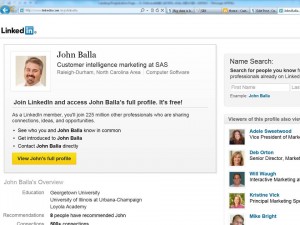
Let me begin by saying that I am a huge fan of Linkedin. To folks who do not know LinkedIn, I always describe it as a "serious social network." When you are on LinkedIn, you post the equivalent of your résumé, add other details, join groups that are usually professionally-oriented and connect with other people (usually business associates). Sometimes you may connect with neighbors or friends, but the idea and intent is usually business-oriented.
For me, one of the coolest things about LinkedIn is when I can encourage connections and facilitate networking among people I know whose paths might not otherwise cross.
In the last year, I've gotten more and more LinkedIn connection requests. And not just the usual outside vendors looking to sell to my company. Many of them are from total strangers with few details and odd combinations of workplace - title - school - geography. Today's weird request (see below) has a decidedly male name and an unmistakably female-looking picture. He/she lives in a small town in Nebraska, and his/her last job was at my own company (but in Norway). Prior to that, he/she worked at Delta Airlines as a manager and the two positions overlapped a few months, all after having graduated from Alabama's Auburn University with a "General Studies" degree. (Huh??)
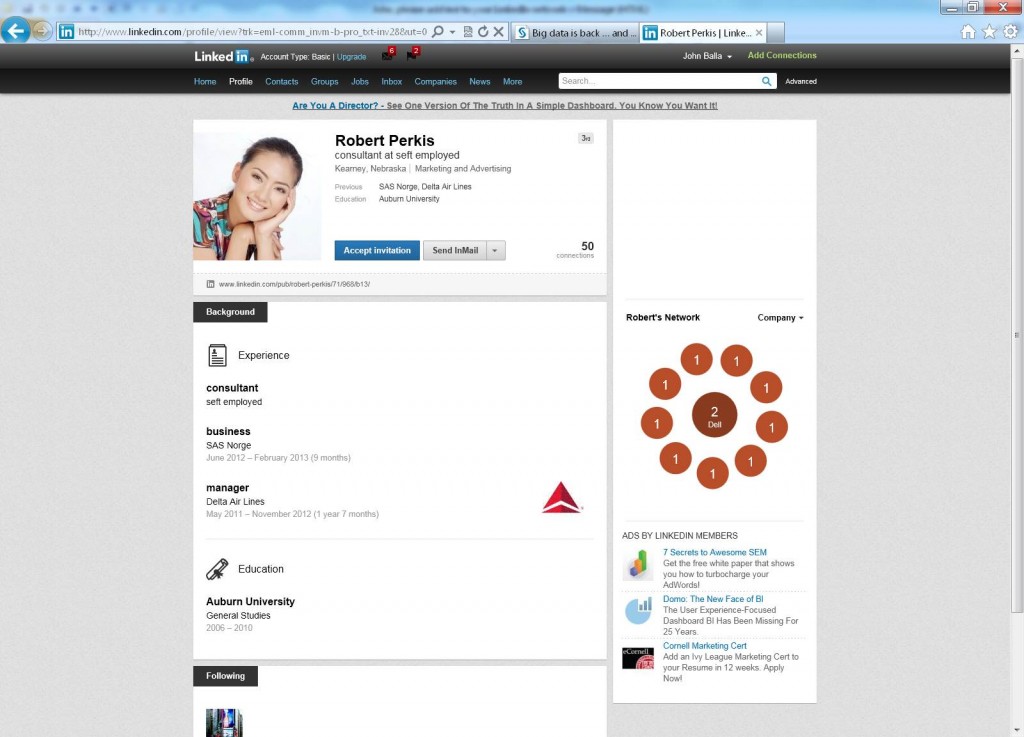
The troubling part is how many of my friends I see that are already connected to these individuals, which tells me that not everyone is scrutinizing these requests.
I am not prone to paranoia or conspiracy theories, but something is amiss here with these requests and my 6th sense is telling me that it's not good. Considering recent reports of state-sponsored hacking and other online activities, there's a chance that my profile might look interesting because of any number of reasons -where I work, who I am connected to, or maybe even where I went to school. Maybe they just want to get my password and then start harvesting my friends' information. For what purpose? I don't know but I am not about to let it happen easily.
Let's say they hack into my password once we've connected? Do I use that same password on other social networks? It's not a stretch to think how my profile information on other social networks (my birthday, maybe my address) might be combined with my work history and used for not-so-nice purposes. It's not too far a stretch.
Many of these odd profiles show the person as currently "Consultant" at "Self-Employed," which is the only information available in the email invitation to connect along with the picture and name(see below). Who is going to callously ignore someone who's self-employed, ostensibly asking to connect because they know someone you know?
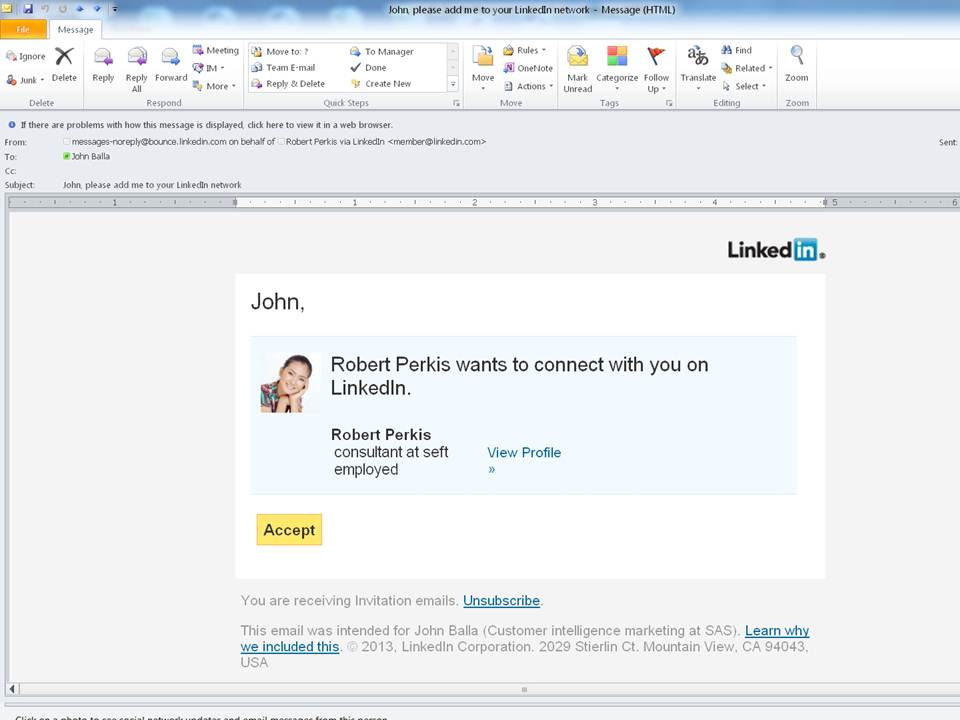
The other issue here is that LinkedIn makes you log in before you can see the person's profile, but that "Accept" button looms much larger in the email. It's all too easy for someone in a hurry to just click the "accept" button.
Take a look at some of these other recent requests I've received and let me know what you think:
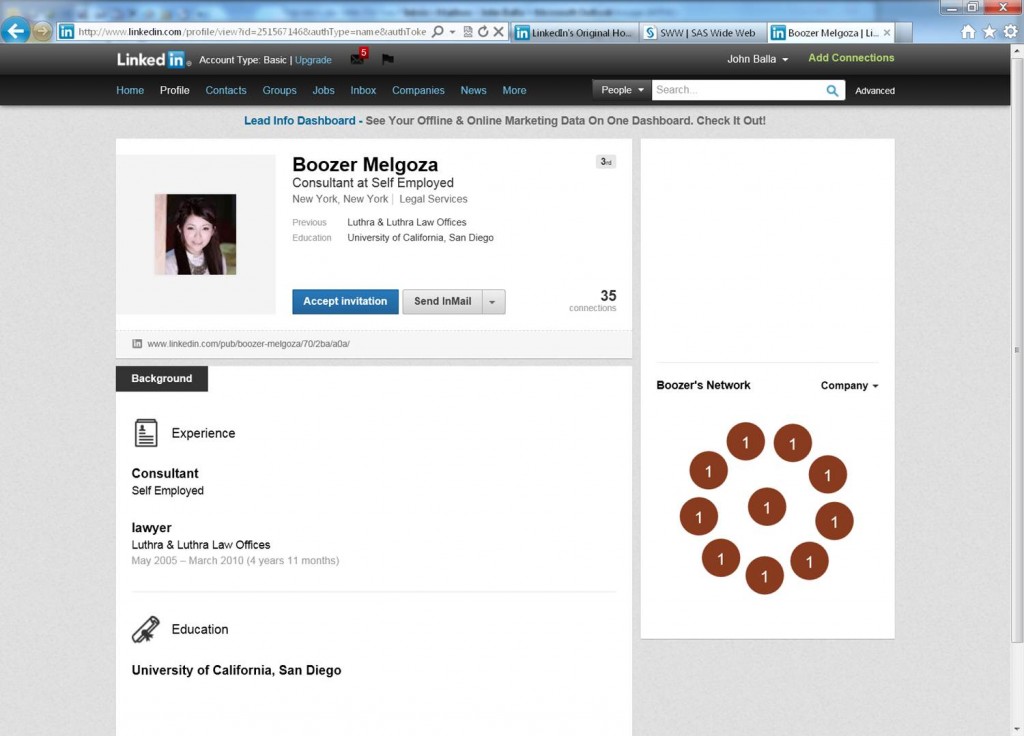
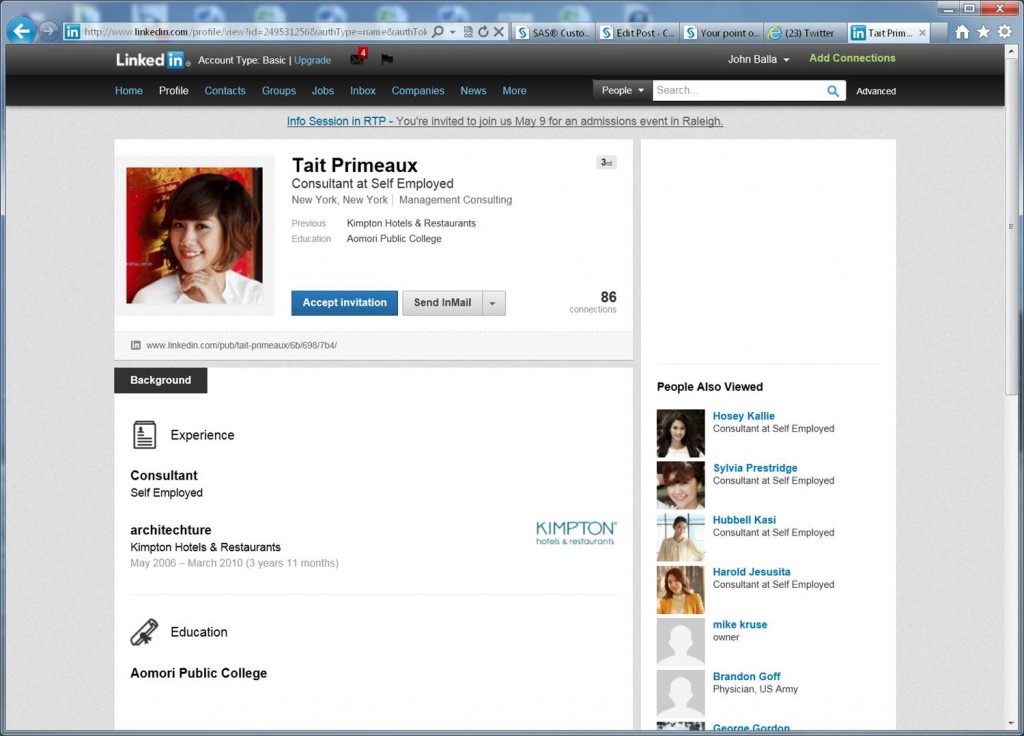
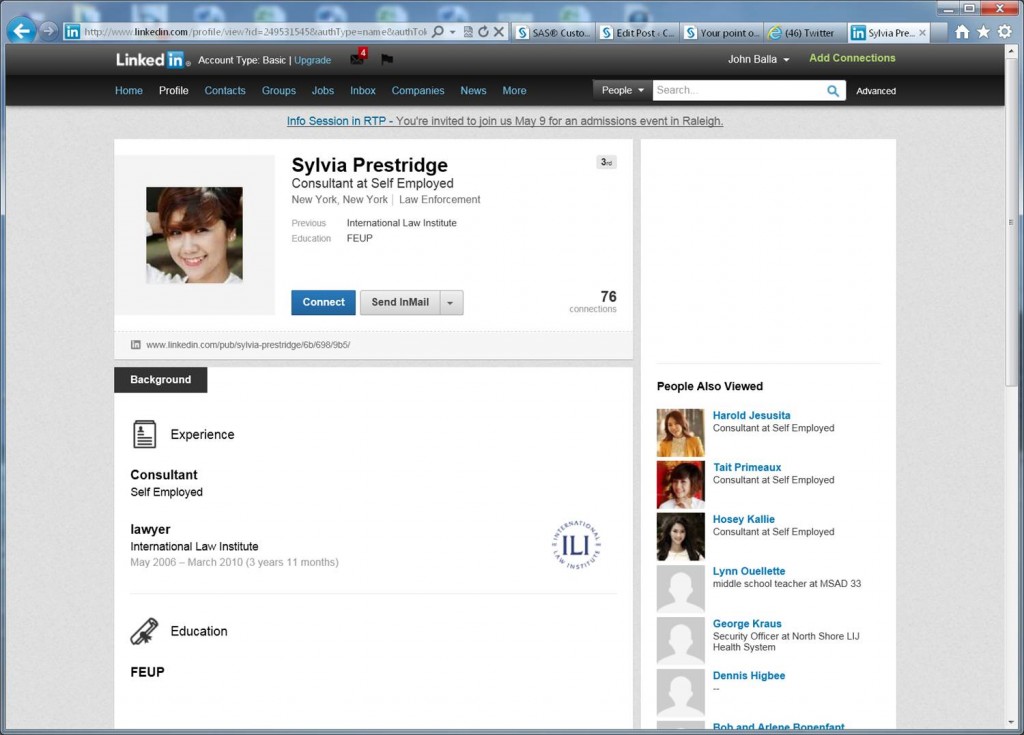
I may be wholly off-base here. And if Robert Perkis, Boozer Melgoza, Harold Jesusita, Tait Primeaux and Sylvia Prestridge are all real people - or if any one of these are real people - then please set the record straight and I'll apologize publicly and remove the screen-shot of your LinkedIn profile from this post.
In the meantime, please be aware that something is amiss and as always, tread carefully with LinkedIn and social media in general. LinkedIn is a little different because of the amount of detailed information you may have in your profile, and LinkedIn is "serious" - nobody is really on there announcing their new favorite brand of jeans, posting pictures of their kids or sharing cat videos.
Treading carefully means paying attention to who you connect to, how you engage with your online friends and what information you make available. Before you click "accept," open a new tab and do a Google search on that name and see what comes up. Then decide if you want to connect.

21 Comments
Thanks John. Very interesting and helpful information. In fact, I need to go and look who I have accepted without giving much thought or looking into the person more closely. Makes you wonder!
Thanks, Diana. It really does make you wonder. Why bother putting a profile together and then trying to get people to connect with you unless they're after something...
John: I have also got similar requests from total strangers. I just ignore them all together. I have 41 requests pending out there.
Thanks for your comment. Ignoring them is definitely one way to approach it, but there's always a part of me wondering whether or not it's really a legitimate request. Why would someone go through the trouble of creating one of these profiles and then trying to connect with other people? It leaves me wondering...
I'm waiting for my apology!
My apologies, Boozer. Now why can't I find your LinkedIn profile any more? And how nice of you to include that link to http://www.scambusters.org/linkedin.html in your comment!
I know this website offers quality based articles or reviews and other stuff, is there
any other web site which presents such data in quality?
Hi Elvia,
Thank you very much! You may want to take a look at some of the other SAS blogs at http://blogs.sas.com/content/.
Thank you!
JB
I also have a one desperate contact who has asked for too many introductions - the last one contacted me and said, thanks...that person you introduced to me is essentially stalking me.
The bigger problem for me has become vendors who want to connect to me only to sell to my company and then use all of my contacts. I'm thinking of putting a statement to the effect of "I don't connect with people unless I know them, have worked with them, know them through someone else who I know well and trust...
Hi Dave,
I totally hear you. I also get a lot of those vendors who just want to sell to my company. Before I agree to connect to someone, I usually do a search on their name to see what comes up. If I can't discern something we share in common or some plausible way for us to "connect" I'll "ignore" the request. I occasionally get linking requests from students or recent graduates and I'll usually connect with them and then offer to make an introduction or two.
Cheers!
JB
Out of the blue requests from people I have never met get a simple background check before I accept. While I may have a small network I believe in quality over quantity anyway.
Hi Raphael,
That sounds like a good approach. I've been surprised at how my network has grown and I enjoy seeing different friends and acquaintances interact with each other on LinkedIn and other places online, and were it not for their connections with me they might never have cause to interact.
Cheers!
JB
Where should I send the tin foil hat to?
Hi Daniel,
You've come to the right place! :) I love tin foil hats, so you can send it to me at: 100 SAS Campus Drive, Cary, NC 27613. Seriously, I do appreciate your commenting and I hope you get some value from this blog.
Have a great day!
JB
Yes, I am starting to be suspicious as well. I am an artist living in NZ and my last request was from a chemical engineer in Iran. Why would he be interested in connecting with me? He doesn't even have art in his list of interests. Almost all of his endorsements are from women like me. In the arts, a bit older, friendly and pleasant looking. Something tells me he isn't looking for employment opportunities or work related connections. Also, the pictures you have shown in your article makes me worry about the girls shown. Is linkedin being used for more sinister uses?
Thanks for sharing your perspective with us. In these cases, it's best to simply refuse the connection request. It's also a good idea to go through your connections from time to time and double-check that there was a good reason to connect in the first place, or they may have simply been in job-search mode and you were a friend-of-a-friend. As my mom always said, better safe than sorry...
Cheers!
JB
This comment is a bit late, however, I think you can rest assured that the people in your post is in fact not real people. The girl in the first profile is a Vietnamese (I think) actor named Ngọc Lan, so she is certainly not a Robert ;)
Hi Katrine,
Thanks for that additional insight and your validation on our "Robert." What's interesting is that I stopped getting so many of those strange link requests after I published this blog post...
Cheers!
JB
The reason for these requests is very simple:
- Get access to data
- Get into individual networks
- Abuse or sell the data
The hacking of accounts would not happen that way - this usually happens through insecure passwords, infected computers or hacks of the platform.
Hi Joe,
I think you're right, and now we know that many of these are probably bots to do the things you laid out. All the more reason to be careful! thanks for your comment.
Cheers!
JB
Yes, I am starting to be suspicious as well. I am an artist living in NZ and my last request was from a chemical engineer in Iran. Why would he be interested in connecting with me? He doesn't even have art in his list of interests. Almost all of his endorsements are from women like me. In the arts, a bit older, friendly and pleasant looking. Something tells me he isn't looking for employment opportunities or work related connections.